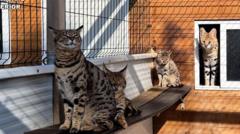The Spanish authorities have apprehended a couple in Majorca for their involvement in the illegal breeding and sale of exotic cats, including endangered species like white tigers, pumas, and clouded leopards. The arrests followed a Civil Guard police raid on the couple's home, where they discovered 19 exotic felines being housed, including a caracal, two servals, and a variety of hybrid cats.
Investigations revealed that the couple's activities were part of a considerable global trafficking network that spanned multiple countries. According to the Civil Guard, most of the animals available for sale originated from Russia, Belarus, and Ukraine, often smuggled into the European Union through Poland with falsified documentation.
The couple's social media presence was reportedly very active, attracting buyers from various countries interested in acquiring these exotic animals. This pattern aligns with rising concerns over the burgeoning illegal wildlife trade in Europe, as highlighted by the International Fund for Animal Welfare (IFAW). The couple also attempted to sell other exotic species, including hyenas and desert lynxes, alongside their feline offerings.
Among the cats seized was a clouded leopard, which had an online asking price of €60,000 (approximately $68,000). This raid is a part of an ongoing crackdown that began last March, with another individual currently under investigation for similarly selling exotic species online.
The rescued animals have been temporarily placed at the Son Servera Safari Zoo in Majorca and are expected to be relocated to a rescue center near Alicante. The increasing demand for exotic cats—often perceived as status symbols—poses significant challenges, as these animals require extensive care and can be highly aggressive, presenting risks to both their owners and other pets. The Spanish Civil Guard has emphasized the dangers associated with these animals and the untold consequences for those who attempt to keep them as status symbols.
Investigations revealed that the couple's activities were part of a considerable global trafficking network that spanned multiple countries. According to the Civil Guard, most of the animals available for sale originated from Russia, Belarus, and Ukraine, often smuggled into the European Union through Poland with falsified documentation.
The couple's social media presence was reportedly very active, attracting buyers from various countries interested in acquiring these exotic animals. This pattern aligns with rising concerns over the burgeoning illegal wildlife trade in Europe, as highlighted by the International Fund for Animal Welfare (IFAW). The couple also attempted to sell other exotic species, including hyenas and desert lynxes, alongside their feline offerings.
Among the cats seized was a clouded leopard, which had an online asking price of €60,000 (approximately $68,000). This raid is a part of an ongoing crackdown that began last March, with another individual currently under investigation for similarly selling exotic species online.
The rescued animals have been temporarily placed at the Son Servera Safari Zoo in Majorca and are expected to be relocated to a rescue center near Alicante. The increasing demand for exotic cats—often perceived as status symbols—poses significant challenges, as these animals require extensive care and can be highly aggressive, presenting risks to both their owners and other pets. The Spanish Civil Guard has emphasized the dangers associated with these animals and the untold consequences for those who attempt to keep them as status symbols.






















